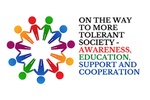Overview of the seminars organised within the project "On the way to a more tolerant society: awareness, education, support and cooperation"
From January to June 2023, as part of the project “On the way to a more tolerant society: awareness, education, support and cooperation”, several informative seminars were organised, informing a total of 221 persons (representing various target groups) about recognizing and reporting discrimination, hate speech and hate crimes.
The target group of this year's first informative seminar, which took place on 26 January, was one of the most vulnerable groups in Latvia - Roma. 20 Roma activists, mediators, representatives of Roma NGOs, as well as representatives of non-Roma organisations who are working with Roma rights from different regions of Latvia took part in the seminar “Roma for tolerance and against discrimination!”. The seminar provided a comprehensive insight into several important human rights issues related to the situation of the Roma community in Latvia. The seminar covered both theoretical issues on how to recognize anti-Roma discrimination, hate speech and hate crimes, as well as practical advice, such as where to turn for help and how to support and encourage victims of discrimination to report the abuses they have experienced. The participants also shared their own experience when faced and witnessed discrimination.
Taking into account that newcomers are another vulnerable group which is exposed to different forms of intolerance and is one of the least informed groups least on how to act in such cases, three workshops were held specifically for this target group. On 13 February, the online seminar was mainly attended by foreign students who have been studying in Latvia for some time. On 13 April , a face-to-face seminar was organised mainly for persons who received subsidiary protection or refugee status in Latvia, including Ukrainian civilians. On April 29, a seminar was held in person for both foreign and local students of Riga Stradiņš University, which was organized in cooperation with the RSU Student Council.
The workshops provided participants with comprehensive information on how to recognize discrimination, hate crime and hate speech, as well as where to report it and where to seek help. The seminars were led by lawyers and human rights experts Anhelita Kamenska, Jekaterina Tumule un Edgars Oļšveskis, in cooperation with the director of an NGO “Make Room Europe” Miks Celmiņš. All three seminars were attended by 67 participants who will be able to apply the acquired knowledge in their daily life and help others.
A no less important group, which is also subject to discrimination, especially because of expressions of hate speech, is youth. Young people spend a large part of their free time on social networks, where anonymity allows people to express themselves in increasingly rude and even dangerous ways, which can later lead to hate crimes in real life. During the project review period, six informative seminars called “Say no to hate” were organized. Representatives of the Latvian Center for Human Rights visited schools and youth centers in various regions of Latvia and by using non-formal education methods spoke to the youth about discrimination and expressions of hatred. During the seminars, participants learned not only what hate speech is and which groups are most often exposed to expressions of intolerance, but also developed their critical thinking skills by participating in discussions about the causes and consequences of hate speech. Participants were informed about the possibilities of how each of us can reduce expressions of hate speech in Latvian society and how to react if we come into contact with discrimination. Participants also learned about tools and possibilities to report hate speech online. In total, 134 participants took part in six seminars, which indicates the interest and desire of youth to participate in building a tolerant and respectful Latvian society.
The project “On the way to a more tolerant society: awareness, education, support and cooperation” is funded by Iceland, Liechtenstein and Norway through the EEA and the Norwegian grant programme “Active Citizens Fund”.
Published: 2023-07-27




